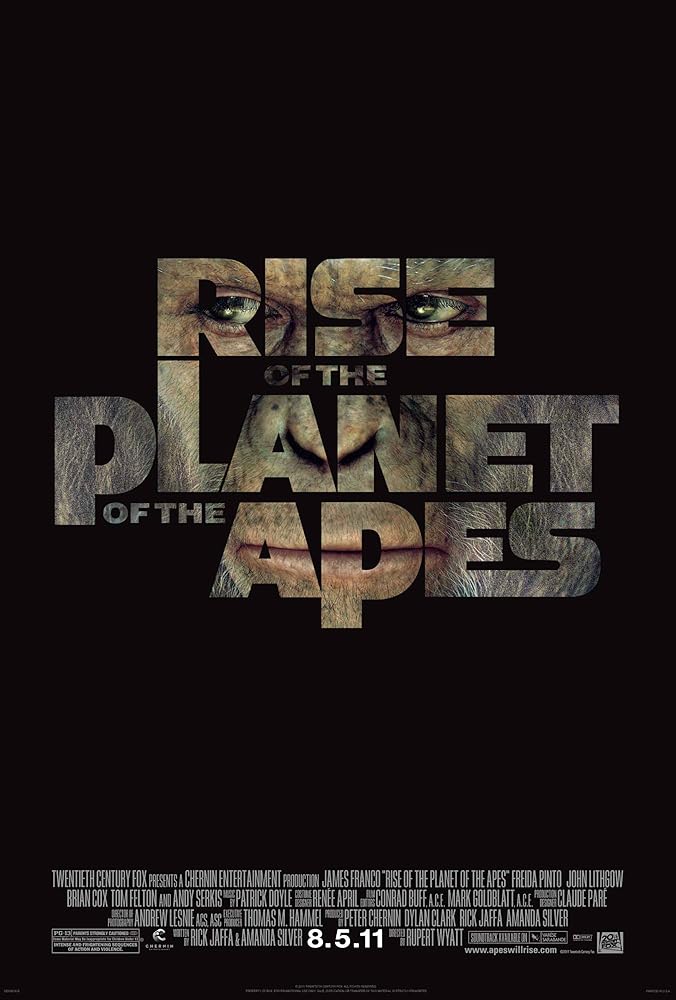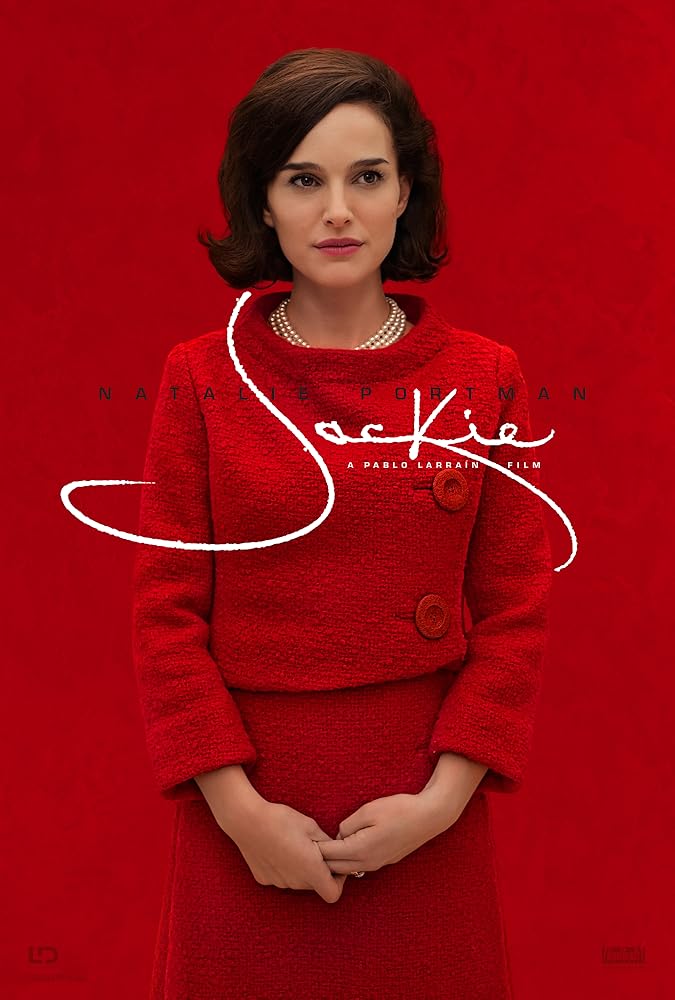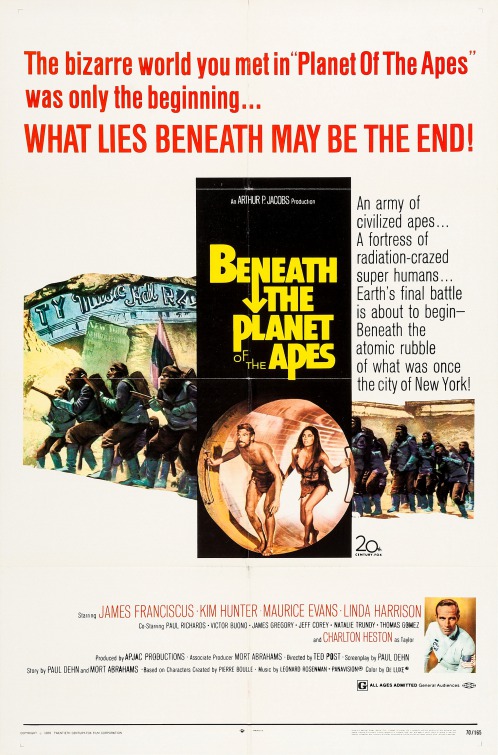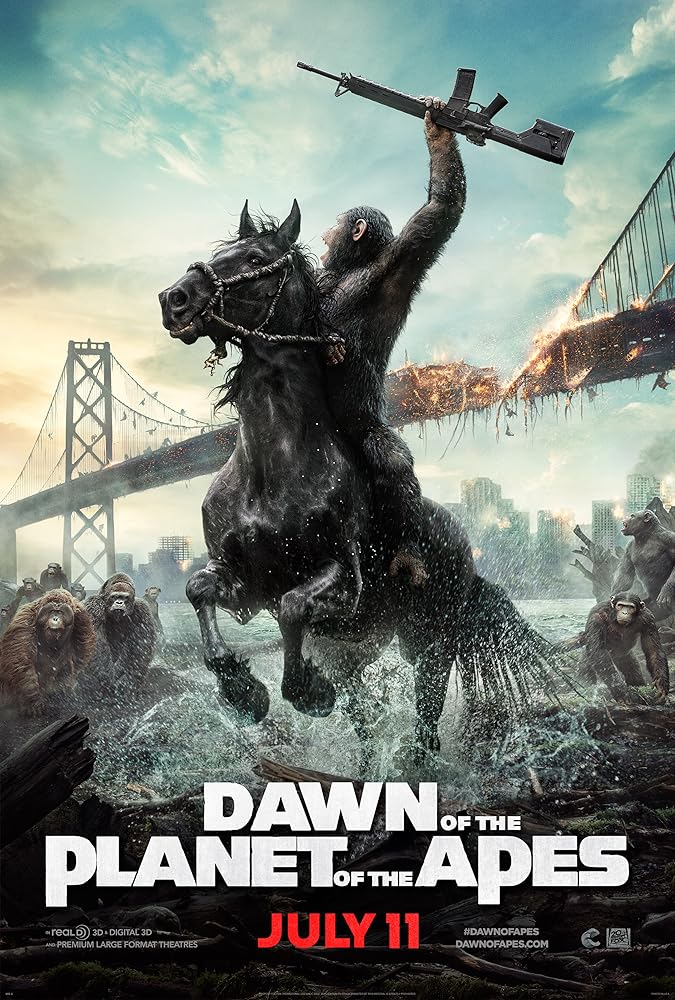With the release of the newest
Planet of the Apes movie, I thought I would take the time to review each film in the series. Of course, if you've scrolled through any previous posts on this blog, I've said that before and never kept up with it. So we'll see. I have trouble finishing things. We'll begin with the prequel trilogy, so today's post is on
Rise of the Planet of the Apes.

SYNOPSIS: James Franco plays a scientist hard at work on engineering a treatment for Alzheimer's in hopes of curing his ailing father. The project proceeds to trials on chimpanzees, but is shut down when one of the promising subjects, uh, goes ape. When it is discovered she had recently given birth and was only protecting her child, Franco adopts the ape and takes him home secretly. This young chimp shows the same mental improvement that its mother did, suggesting the drug works. Franco continues the work at home, names the ape Cesar (played in motion-capture by Andy Serkis), and tests the drug on his father. It works initially, but eventually the man's body fights it off as the compound is in fact a neurogenic virus designed to rebuild brain pathways. Franco discovers that his father's antibodies are fighting off the infection, but he believes a stronger version of the treatment will work. Unfortunately, a horrible incident in the neighborhood leads to Cesar being sent to a zoo where he is mistreated while Franco begins new clinical trials and tries to get his ape son back. But Cesar is emotionally wounded, and decides to take matters into his own hands. Meanwhile, the new viral strain turns out to be very effective on apes, but deadly to humans. Cesar leads an ape uprising releasing all of his compatriots from the zoo, after making them super-intelligent as well, and they flee into the California woods. But as the film ends, the virus has accidentally begun to spread globally. Oh, and we learn in passing of the launch of the first manned mission to Mars, which seems to be lost in space...
Rise of the Planet of the Apes is a movie that shouldn't work in a franchise that was dead, and yet it mostly does. It came at an opportune time, a conflux of cultural elements. The fight against Alzheimer's had been growing steadily. There were recent news stories about ape attacks, particularly of someone who had a pet chimpanzee that bit her face off. And Andy Serkis, after making a splash in
Lord of the Rings had become the go-to name in motion-capture work, just recently portraying the titular gorilla in Peter Jackson's remake of
King Kong. So it was no surprise that he was cast to play yet another ape, in a role designed to bridge the gap between animal and man. All of these elements lead up to an interesting way to get an audience invested in a film series that had long since been dead, particularly after Tim Burton's failed reboot. A prequel seemed a bit audacious, at a time when films like
Terminator Salvation weren't doing well going that route.
I confess, I didn't see the film upon its initial release because I wanted to watch the original 1968 film first, and never got around to it back then. I soon saw the Tim Burton remake (which I have since forgotten almost everything about), but as that movie is not in this continuity, it was irrelevant. I finally bit the bullet and watched the classic film when it was screened theatrically last year. I was now ready to go back to the prequels, and so I watched
Rise of the Planet of the Apes just a few hours ago. On the whole, I enjoyed the movie. While it's totally possible to view the film on its own as an introduction to this series, I would not suggest it. I think it's better to take the original film on its own terms first, especially if you are young and haven't had any of its plot points spoiled for you. Sadly, the film is so old, that the ending reveal is referenced incessantly by other works, so it's harder to go into it cold. If you already know the major reveals, you can start with
Rise.
It is impossible to review this movie without a discussion of the effects work. On the whole, it holds up, even today, though not as well as it could. The apes are all entirely computer-generated. This certainly makes sense from a production standpoint, for safety and ethics reasons, and for the story points of making Cesar the link to the more humanoid sapients of the later films. The visuals are better than something like
Jumanji, but there is still that uncanny valley territory where you know you are looking at something artificial. Part of this comes in the mannerisms of the apes, who appear to stand upright a little too much. With Cesar I suspect it was intentional; he walks nearly upright and holds himself like a human. But other apes are just apes, and sometimes it seems to me they aren't quite animal enough. I'm no expert, and haven't seen real chimpanzee footage in a while, but something about it seemed a little off to me, and I think that comes from it being humans performing the actions. I also note that these cartoon apes lack visible genitals (and while I know that some apes have tiny genitals, it feels like real animals have been neutered for film decency) and that takes just a tiny bit of reality away from the proceedings.
If you liked hating Draco Malfoy in the
Harry Potter series, you'll enjoy watching Tom Felton playing basically the same character; an abusive keeper at the ape enclosure. The cast is very good, including David Oyelowo before he became a name, and Frieda Pinto fresh off
Slumdog Millionaire. John Lithgow is effecting in his limited screen time as Franco's father. But of course what everyone talks about is Andy Serkis. There are moments you can tell it's Serkis; here and there a facial feature crept in, and ultimately he gets some vocalization in. But there's enough ape in there that Cesar becomes a distinct character design, a half-way point between Gollum and Kong. How much of what appears onscreen is Serkis and how much is the animators I don't know, but I wouldn't want to slight either of them. There's been a lot of talk in recent years of nominating Serkis for acting awards, with the argument made he's giving the full performance, no different from an actor in makeup. But there is a difference, and some of the WETA animators have spoken up on feeling slighted (especially regarding
Lord of the Rings, when this technology was less advanced). I prefer to see it as more analogous to sophisticated puppetry.
And speaking of puppetry, that is something I couldn't help feeling was missing. While I fully appreciate the visual effects we got and the performances that accompanied them, there's still something about having a tangible object on set that feels different. I would have liked a little bit of classic puppet work mixed in, just to lend something tactile to the apes. The Stan Winston or Jim Henson creature shops could have worked up something. A film like
Jurassic Park still holds up because it used both techniques (and some of its fully CG work has aged badly). Actually
The Lost World has even better blended practical and digital effects. Certainly if you want to feel the expression on Cesar's face, go with the mo-cap. But a shot here or there of Franco touching a tangible chimpanzee hand instead of a digital one would have sold the illusion better, I think. The nature of visual effects is they tend to look dated fairly quickly as time passes and techniques improve.
I liked the little nods to the original film, particularly in the way they casually tease the Mars mission in background elements like TV broadcasts and newspapers. However, it went just a little too far for me in quoting the now infamous line, "Get your stinking paws off me, you damn dirty ape!" It makes total sense in the moment, and it leads to a huge turning point in the film, but something about directly quoting like that made me bristle. It took me out of the film for a minute.
What's most unique about this movie is its pacing. It's got elements of the more deliberate pace of the original, but moves at just the right speed for the plot. So much of the film is done without dialogue; which makes sense when one of your lead characters can only communicate in sign. It was refreshing for a big studio franchise movie to tell its story
visually. This is not the kind of movie you can just put on and not pay attention to. It demands to be watched. There are a number of wordless moments that communicate a great deal. And that's where it is most effective, communicating through action and situation the drama, using words when necessary. It's nice that people still know how to make movies like that.
Rise of the Planet of the Apes was an unexpectedly smart jumpstart to an ailing franchise. If I have complaints beyond aging effects work, they are concerned more with themes as they relate to the original film. I'll delve into those more when (if?) I cover that movie.
Rise is concerned with themes of animal rights, and it's generally effective, while still working as a prequel that's not too prequel-y. I'm curious why the film was set in the San Francisco area, rather than the East Coast. But it's a script that makes sense, and a film that's directed well by Rupert Wyatt. Part of me wishes it had a different title though. While it signals the franchise, the title rather spoils things for the future, and part of me wishes it had just been called
Rise of the Apes instead. But this is a minor complaint. I'm sure Fox wanted to let people know what the film was so that it would make money. I applaud them for succeeding in also making a pretty good movie.










